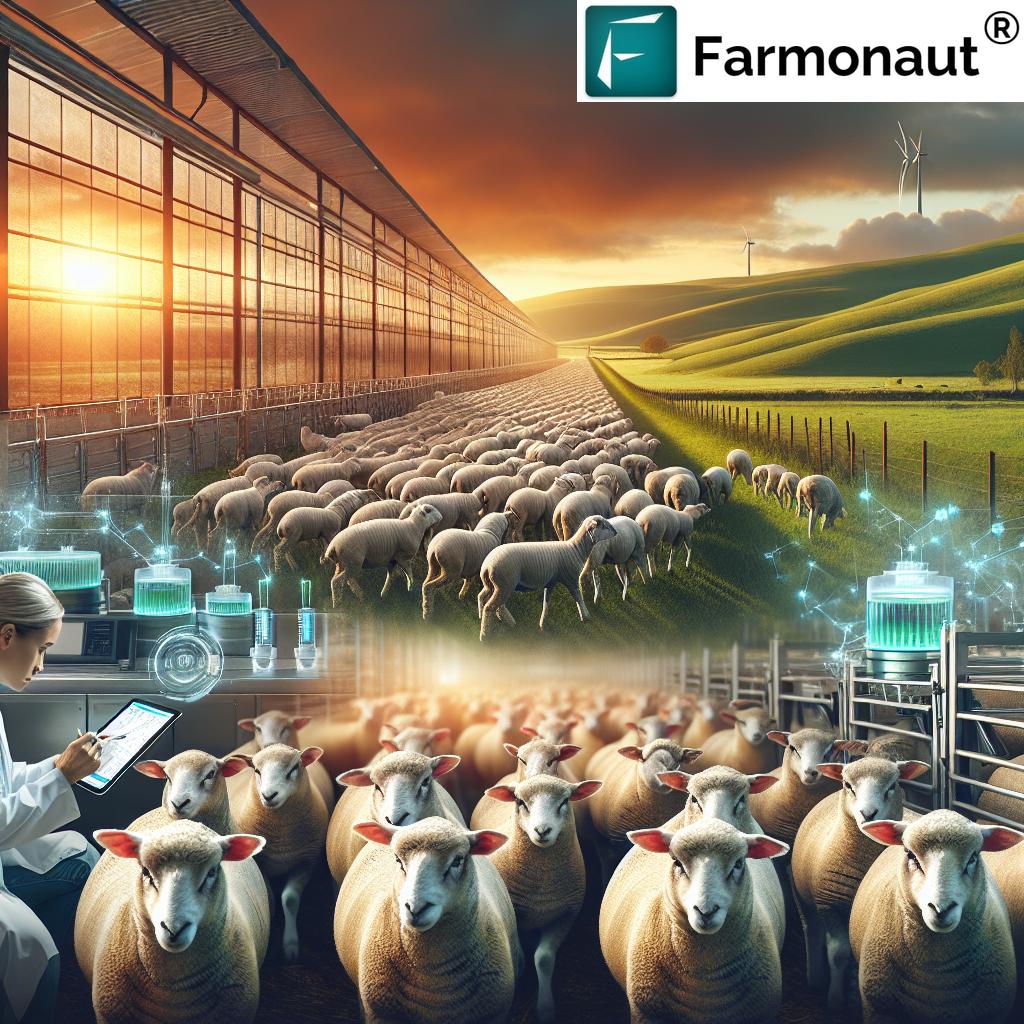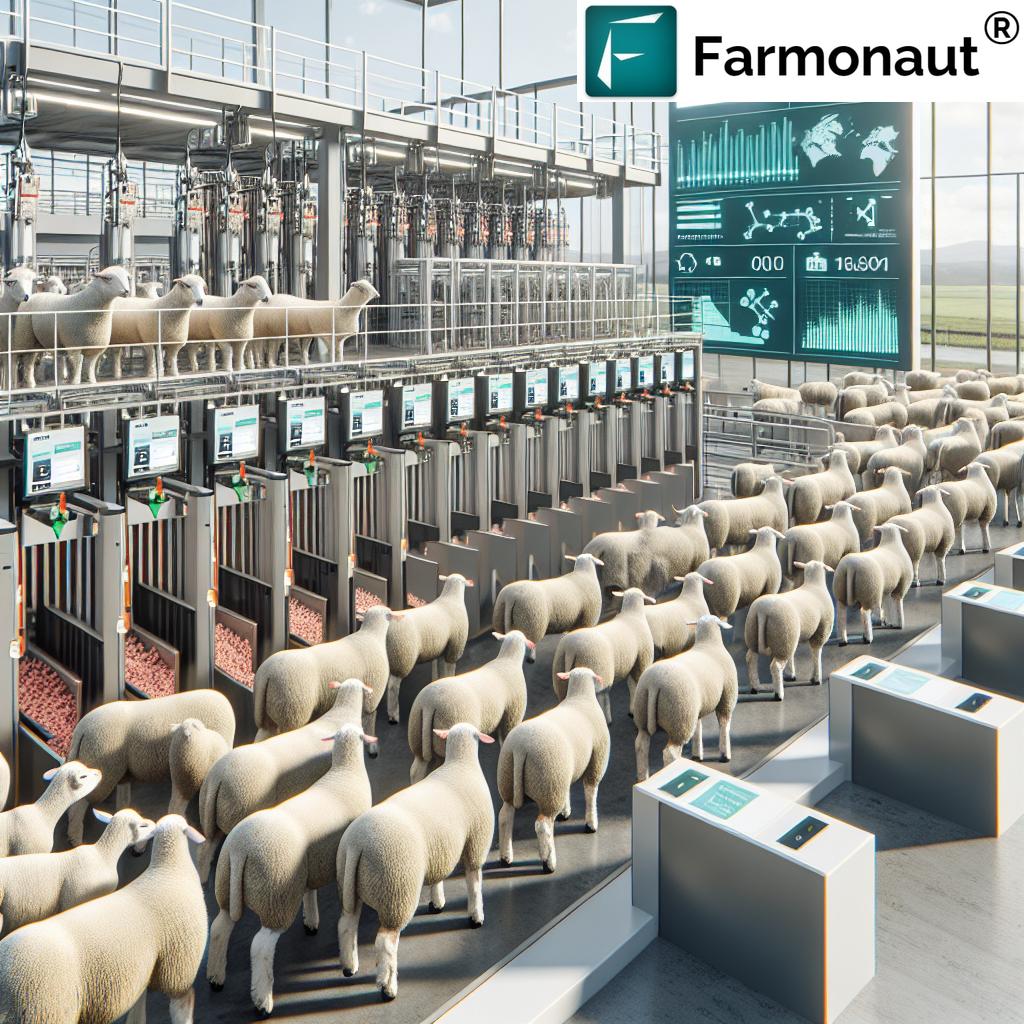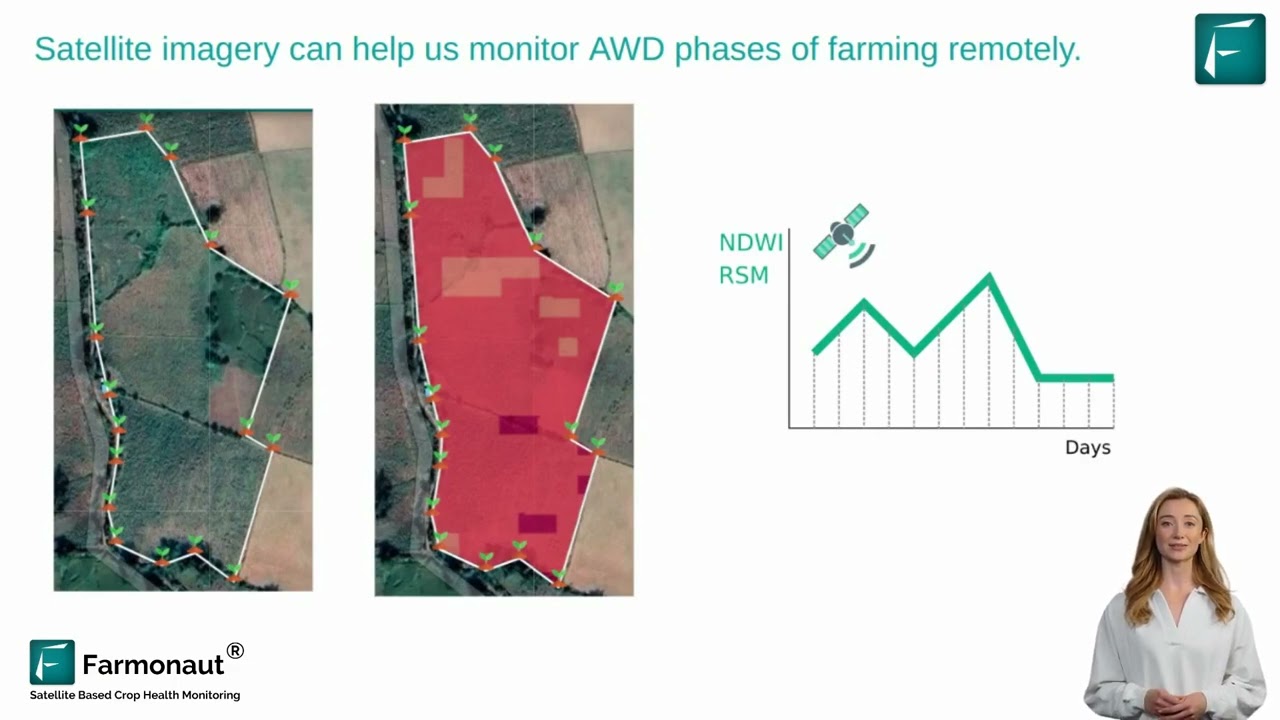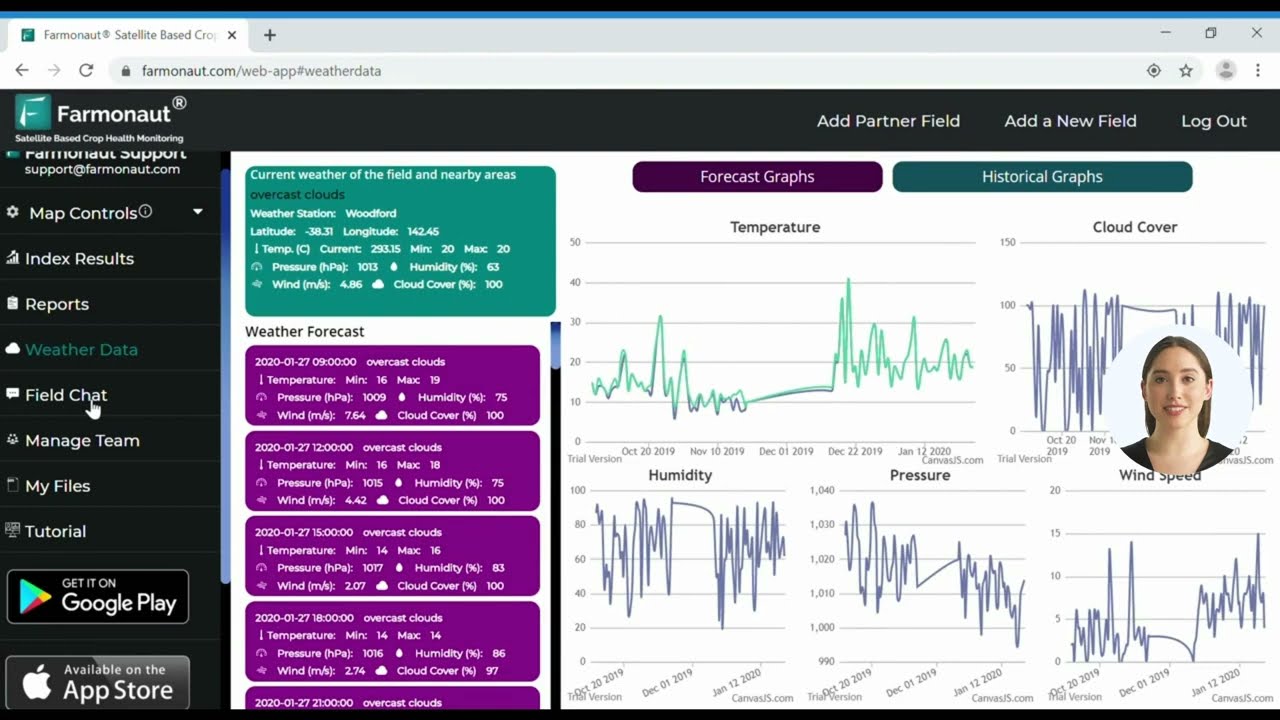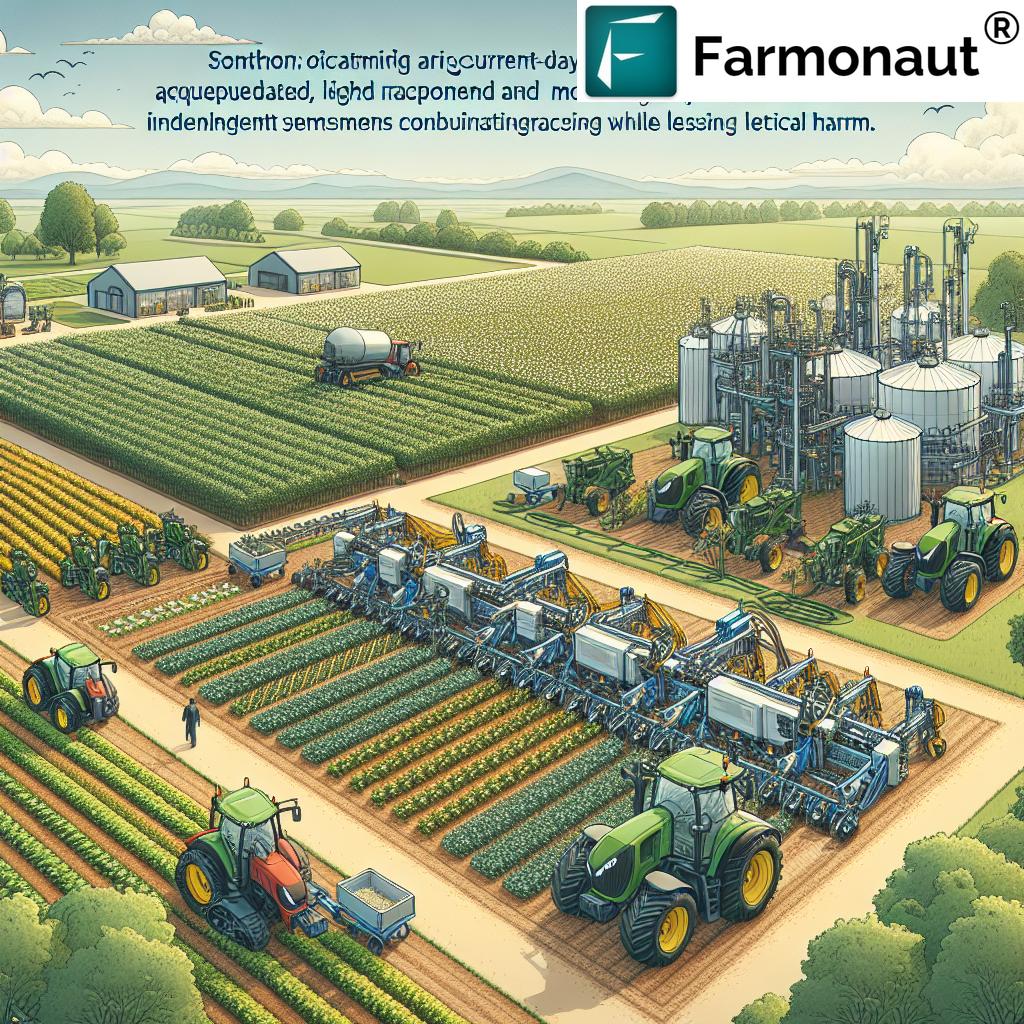Mastering Lamb Vaccination: Boost Your Sheep Farm’s Health and Profitability with Farmonaut’s Precision Agriculture Solutions
“Proper lamb vaccination can reduce mortality rates by up to 80% in sheep farms, significantly boosting profitability.”
Welcome to our comprehensive guide on mastering lamb vaccination and revolutionizing your sheep farm’s health and profitability. As sheep producers, we understand the critical role that proper vaccination plays in maintaining a healthy and productive flock. In this article, we’ll delve deep into the world of lamb vaccination, exploring best practices, economic benefits, and how cutting-edge technology like Farmonaut’s precision agriculture solutions can elevate your sheep farming operation to new heights.
The Importance of Lamb Vaccination in Sheep Farm Management
Lamb vaccination is a cornerstone of effective sheep farm management. By implementing a robust vaccination program, we can significantly reduce the risk of devastating diseases that can decimate our flocks and drastically impact our bottom line. Proper vaccination not only protects individual animals but also contributes to the overall health of the entire herd through herd immunity.
Let’s explore some key reasons why lamb vaccination should be a top priority for every sheep producer:
- Disease Prevention: Vaccines stimulate the immune system to protect lambs against common and potentially fatal diseases such as pulpy kidney, tetanus, and cheesy gland (CLA).
- Economic Benefits: A well-implemented vaccination program can lead to reduced veterinary costs, decreased mortality rates, and improved overall productivity.
- Animal Welfare: Vaccinated lambs experience less suffering from preventable diseases, promoting better animal welfare standards on our farms.
- Sustainable Farming: By reducing the need for antibiotics and other treatments, vaccination contributes to more sustainable sheep farming practices.
As we dive deeper into the world of lamb vaccination, it’s crucial to understand that modern technology can play a significant role in optimizing our vaccination strategies. This is where Farmonaut’s precision agriculture solutions come into play, offering innovative tools to enhance our sheep farm management practices.
Understanding the Basics of Lamb Vaccination
Before we delve into the specifics of vaccination schedules and best practices, it’s essential to grasp the fundamental concepts behind lamb vaccination. Vaccines work by introducing a harmless form of a disease-causing organism (or parts of it) into the lamb’s body. This stimulates the immune system to produce antibodies, preparing it to fight off future infections more effectively.
Key points to remember about lamb vaccination:
- Timing is crucial: Administering vaccines at the right age and stage of development ensures optimal protection.
- Multiple doses are often required: Many vaccines need booster shots to maintain long-term immunity.
- Different vaccines target specific diseases: Understanding which diseases pose the greatest risk to your flock helps in selecting the most appropriate vaccines.
- Proper storage and handling are essential: Vaccines must be stored and administered correctly to maintain their efficacy.
Essential Vaccines for Lambs: Protecting Against Common Threats
When it comes to lamb vaccination, there are several core vaccines that every sheep producer should consider. These vaccines protect against some of the most common and potentially devastating diseases that can affect our flocks. Let’s explore the essential vaccines and the diseases they prevent:
- Clostridial Vaccines:
- Pulpy Kidney (Enterotoxaemia)
- Tetanus
- Blackleg
- Malignant Oedema
- Caseous Lymphadenitis (CLA) Vaccine:
- Prevents Cheesy Gland
- Ovine Johne’s Disease (OJD) Vaccine:
- Reduces the impact of this chronic wasting disease
- Scabby Mouth Vaccine:
- Protects against contagious ecthyma
Now, let’s take a closer look at the recommended vaccination schedule for lambs:
| Vaccine Type | Age at Vaccination | Diseases Prevented | Economic Benefits |
|---|---|---|---|
| 5-in-1 Clostridial | 6-8 weeks, booster at 12-16 weeks | Pulpy Kidney, Tetanus, Blackleg, Malignant Oedema, Black Disease | Reduces mortality by 70-80%, increases lamb survival rates |
| Cheesy Gland (CLA) | 8-12 weeks, annual booster | Caseous Lymphadenitis | Improves carcass quality, reduces abattoir rejections by 15-20% |
| OJD | 4-16 weeks (one-time vaccination) | Ovine Johne’s Disease | Decreases mortality rates, improves flock productivity by 10-15% |
| Scabby Mouth | From 6 weeks onwards | Contagious Ecthyma | Reduces treatment costs, improves animal welfare and market acceptance |
By following this vaccination schedule, we can significantly reduce the risk of disease outbreaks in our flocks and maximize the economic benefits of our sheep farming operations.
Implementing a Successful Lamb Vaccination Program
Now that we understand the importance of lamb vaccination and the essential vaccines to consider, let’s discuss how to implement a successful vaccination program on our sheep farms. A well-executed vaccination strategy is crucial for maximizing the health and profitability of our flocks.
1. Consult with a Veterinarian
Before implementing any vaccination program, it’s essential to consult with a qualified veterinarian who specializes in sheep health. They can help us:
- Assess the specific disease risks in our area
- Develop a tailored vaccination schedule for our flock
- Provide guidance on proper vaccine storage and administration techniques
2. Proper Vaccine Storage and Handling
To ensure the effectiveness of our vaccines, we must store and handle them correctly:
- Store vaccines at the recommended temperature (usually between 2-8°C)
- Use a reliable refrigerator with a temperature monitoring system
- Never freeze vaccines unless specified by the manufacturer
- Use vaccines before their expiration date
- Once opened, use the vaccine within the recommended timeframe
3. Correct Administration Techniques
Proper administration of vaccines is crucial for their effectiveness:
- Follow the manufacturer’s instructions for dosage and route of administration
- Use clean, sterile equipment for each vaccination session
- Administer vaccines in the recommended site (usually the neck area)
- Ensure proper restraint of lambs during vaccination to minimize stress and ensure accurate dosing
4. Timing and Scheduling
Timing is critical when it comes to lamb vaccination:
- Vaccinate lambs at the recommended age for each specific vaccine
- Plan vaccination sessions to coincide with other management practices (e.g., weaning) to reduce handling stress
- Consider the breeding cycle of your flock when planning vaccination schedules
5. Record Keeping
Maintaining accurate records of vaccinations is essential for effective flock management:
- Record the date, type of vaccine, and batch number for each vaccination session
- Keep track of which animals have been vaccinated and when booster shots are due
- Use these records to evaluate the effectiveness of your vaccination program over time
By implementing these best practices, we can ensure that our lamb vaccination program is as effective as possible, leading to healthier flocks and improved profitability.
“Implementing a comprehensive vaccination program can increase sheep production efficiency by 15-20% through improved animal health.”
Leveraging Technology for Optimal Sheep Farm Management
In today’s rapidly evolving agricultural landscape, technology plays a crucial role in optimizing sheep farm management practices, including vaccination programs. Farmonaut’s precision agriculture solutions offer innovative tools that can help us take our sheep farming operations to the next level.
Satellite-Based Crop Health Monitoring
While primarily focused on crop management, Farmonaut’s satellite-based monitoring system can also benefit sheep producers by providing valuable insights into pasture health and grazing conditions. This technology allows us to:
- Monitor vegetation health (NDVI) of grazing areas
- Assess soil moisture levels to optimize pasture management
- Make informed decisions about grazing rotations and stocking rates
By ensuring optimal pasture conditions, we can support the overall health of our flocks, complementing our vaccination efforts.
AI-Powered Advisory Systems
Farmonaut’s Jeevn AI advisory system can be adapted to provide valuable insights for sheep producers:
- Receive personalized recommendations for flock management based on real-time data
- Access expert advice on optimizing vaccination schedules
- Stay informed about potential disease outbreaks in your area
Resource Management Tools
Efficient resource management is crucial for successful sheep farming. Farmonaut’s tools can help us:
- Optimize water usage for pastures and livestock
- Track and manage feed inventories
- Plan infrastructure improvements based on data-driven insights
Carbon Footprint Tracking
As sustainability becomes increasingly important in agriculture, Farmonaut’s carbon footprint tracking can help sheep producers:
- Monitor and reduce environmental impact
- Identify areas for improvement in farm operations
- Potentially access carbon credit markets or sustainability certifications
By integrating these technological solutions into our sheep farming practices, we can create a more efficient, sustainable, and profitable operation that complements our vaccination efforts.
Economic Benefits of a Robust Lamb Vaccination Program
Implementing a comprehensive lamb vaccination program is not just about protecting animal health; it’s also a sound economic decision. Let’s explore the various ways in which proper vaccination can boost the profitability of our sheep farming operations:
1. Reduced Mortality Rates
One of the most significant economic benefits of vaccination is the reduction in lamb mortality rates. By preventing deadly diseases, we can:
- Increase the number of lambs that survive to market age
- Improve overall flock productivity
- Maximize return on investment in breeding and rearing costs
2. Decreased Veterinary and Treatment Costs
Prevention is always more cost-effective than treatment. A well-implemented vaccination program can lead to:
- Fewer sick animals requiring veterinary care
- Reduced need for expensive medications and treatments
- Lower labor costs associated with treating ill animals
3. Improved Growth Rates and Feed Efficiency
Healthy lambs grow faster and utilize feed more efficiently. Vaccination contributes to:
- Better weight gain in lambs
- Improved feed conversion ratios
- Earlier market readiness, potentially allowing for more production cycles
4. Enhanced Carcass Quality
Vaccinations, particularly against diseases like CLA, can improve carcass quality:
- Fewer carcass rejections at the abattoir
- Higher-grade meat classifications
- Potential for premium pricing for high-quality lamb products
5. Increased Wool Production and Quality
For wool-producing sheep, better health through vaccination can lead to:
- Increased wool yield per animal
- Improved wool quality and strength
- Higher returns from wool sales
6. Long-term Flock Health and Productivity
A consistent vaccination program contributes to the overall health and longevity of the flock:
- Extended productive lifespan of breeding ewes
- Improved fertility rates
- More consistent lamb crops year after year
By considering these economic benefits, it becomes clear that investing in a robust lamb vaccination program is not just an expense, but a strategic decision that can significantly enhance the profitability and sustainability of our sheep farming operations.
Integrating Vaccination with Other Sheep Farm Management Practices
While vaccination is a crucial component of sheep health management, it’s important to integrate it with other best practices for optimal results. Let’s explore how we can combine vaccination with other key aspects of sheep farm management:
1. Nutrition and Feeding
Proper nutrition is essential for the immune system to respond effectively to vaccines:
- Ensure adequate protein and energy intake for lambs before and after vaccination
- Supplement with essential minerals and vitamins to support immune function
- Consider using Farmonaut’s resource management tools to optimize feed planning and inventory
2. Parasite Control
A comprehensive parasite control program complements vaccination efforts:
- Implement regular fecal egg count monitoring
- Use strategic deworming practices to minimize resistance
- Rotate pastures to break parasite lifecycles
3. Biosecurity Measures
Strict biosecurity practices help prevent the introduction and spread of diseases:
- Quarantine new animals before introducing them to the flock
- Maintain clean and hygienic lambing areas
- Limit visitor access to sheep housing and pastures
4. Breeding and Genetics
Selective breeding can enhance disease resistance in your flock:
- Select for genetic traits associated with disease resistance
- Consider using Farmonaut’s AI advisory system to inform breeding decisions
- Maintain accurate records of health and productivity traits
5. Environmental Management
Proper environmental management supports overall flock health:
- Ensure adequate shelter from extreme weather conditions
- Maintain clean and dry bedding areas
- Use Farmonaut’s satellite monitoring to assess pasture conditions and plan rotations
6. Stress Reduction
Minimizing stress helps maintain strong immune function:
- Handle sheep calmly and efficiently during management procedures
- Provide adequate space and resources to prevent competition
- Consider timing of stressful events (e.g., weaning) in relation to vaccination
By integrating these management practices with a robust vaccination program, we can create a holistic approach to sheep health and productivity. Farmonaut’s precision agriculture solutions can play a valuable role in optimizing many of these aspects, from pasture management to resource planning.
Overcoming Challenges in Lamb Vaccination
While the benefits of lamb vaccination are clear, sheep producers may face various challenges in implementing and maintaining an effective vaccination program. Let’s address some common hurdles and discuss strategies to overcome them:
1. Cost Concerns
The initial investment in vaccines and equipment can be a concern for some producers:
- Consider the long-term economic benefits of reduced disease incidence and improved productivity
- Explore bulk purchasing options or cooperatives to reduce costs
- Utilize Farmonaut’s resource management tools to optimize vaccine usage and minimize waste
2. Time and Labor Constraints
Vaccinating large flocks can be time-consuming and labor-intensive:
- Plan vaccination sessions to coincide with other management practices
- Invest in efficient handling systems to streamline the process
- Consider using Farmonaut’s AI advisory system to help schedule and plan vaccination events
3. Cold Chain Management
Maintaining the proper temperature for vaccines can be challenging, especially in remote areas:
- Invest in reliable refrigeration equipment with temperature monitoring
- Use insulated containers for transporting vaccines to pastures
- Consider solar-powered refrigeration options for off-grid locations
4. Vaccine Efficacy Concerns
Ensuring the effectiveness of vaccines is crucial for producer confidence:
- Source vaccines from reputable suppliers
- Follow manufacturer guidelines for storage and administration
- Monitor flock health closely and keep detailed records to assess vaccine performance
5. Resistance to Change
Some producers may be hesitant to adopt new vaccination practices:
- Educate yourself and your team on the latest research and best practices
- Start with a small-scale trial to demonstrate the benefits
- Seek advice from successful producers who have implemented comprehensive vaccination programs
6. Record Keeping and Compliance
Maintaining accurate vaccination records can be challenging but is essential for proper management:
- Implement a user-friendly digital record-keeping system
- Consider using Farmonaut’s platform to integrate vaccination records with other farm management data
- Regularly review and update records to ensure compliance with industry standards and regulations
By addressing these challenges head-on and leveraging technology like Farmonaut’s precision agriculture solutions, we can overcome obstacles to implementing an effective lamb vaccination program. Remember, the long-term benefits of a healthy, productive flock far outweigh the initial challenges of establishing a robust vaccination strategy.
Future Trends in Lamb Vaccination and Sheep Farm Management
As we look to the future of sheep farming, several exciting trends are emerging that promise to revolutionize lamb vaccination and overall farm management. Let’s explore some of these developments and how they might shape the industry:
1. Precision Livestock Farming
The integration of technology like Farmonaut’s precision agriculture solutions with livestock management is set to transform sheep farming:
- Individual animal monitoring through wearable sensors
- Real-time health tracking to detect early signs of illness
- Automated vaccination reminders based on individual animal data
2. Advanced Vaccine Technologies
Ongoing research is leading to more effective and convenient vaccine options:
- Development of multi-valent vaccines that protect against multiple diseases
- Exploration of needle-free vaccination methods for reduced stress and improved safety
- Research into DNA vaccines for more targeted immune responses
3. Genomic Selection for Disease Resistance
Advancements in genetic research are opening new possibilities for breeding disease-resistant sheep:
- Identification of genetic markers associated with enhanced immune function
- Breeding programs focused on developing lines with natural resistance to specific diseases
- Integration of genomic data with Farmonaut’s AI advisory systems for optimized breeding decisions
4. Sustainable and Organic Farming Practices
Growing consumer demand for sustainable and organic products is influencing vaccination strategies:
- Development of vaccines compatible with organic certification requirements
- Increased focus on natural immune boosters and alternative health management practices
- Use of Farmonaut’s carbon footprint tracking to demonstrate sustainable farming practices
5. Big Data and Predictive Analytics
The power of data analysis is set to revolutionize disease prevention and management:
- Use of machine learning algorithms to predict disease outbreaks
- Development of tailored vaccination programs based on farm-specific data
- Integration of regional health data with Farmonaut’s platform for more informed decision-making
6. One Health Approach
Increasing recognition of the interconnectedness of animal, human, and environmental health:
- Development of vaccines that address both animal health and public health concerns
- Increased collaboration between veterinary and human medical research
- Holistic farm management approaches that consider broader ecological impacts
As these trends continue to evolve, sheep producers who stay informed and adapt their practices will be well-positioned for success. By embracing technologies like Farmonaut’s precision agriculture solutions and staying open to new vaccination strategies, we can create more resilient, productive, and sustainable sheep farming operations for the future.
Conclusion: Embracing Innovation for Healthier Flocks and Profitable Farms
As we’ve explored throughout this comprehensive guide, mastering lamb vaccination is a crucial step towards boosting your sheep farm’s health and profitability. By implementing a robust vaccination program and integrating it with other best management practices, we can significantly reduce disease risks, improve animal welfare, and enhance overall farm productivity.
The key takeaways from our discussion include:
- The critical importance of timely and appropriate lamb vaccination
- The economic benefits of a well-implemented vaccination program
- The integration of vaccination with other aspects of sheep farm management
- Strategies for overcoming common challenges in lamb vaccination
- Exciting future trends in sheep health management and vaccination
As we look to the future, the integration of precision agriculture solutions, like those offered by Farmonaut, will play an increasingly important role in optimizing our sheep farming operations. By leveraging satellite-based monitoring, AI-driven advisory systems, and advanced data analytics, we can make more informed decisions about flock health, pasture management, and resource allocation.
Remember, successful sheep farming is about more than just preventing disease; it’s about creating a holistic system that promotes animal health, farm productivity, and sustainable practices. By staying informed about the latest developments in lamb vaccination and sheep farm management, and by embracing innovative technologies, we can ensure the long-term success and profitability of our operations.
Let’s commit to continual learning and adaptation, always striving to provide the best care for our flocks while maximizing the efficiency and sustainability of our farms. With the right knowledge, tools, and strategies, we can master lamb vaccination and elevate our sheep farming practices to new heights of success.
FAQs
- Q: How often should lambs be vaccinated?
A: The vaccination schedule depends on the specific vaccines and local disease risks. Generally, lambs receive their first vaccinations at 6-8 weeks of age, with boosters given 4-6 weeks later. Some vaccines require annual boosters. - Q: Can pregnant ewes be vaccinated?
A: Yes, vaccinating pregnant ewes is often recommended to provide passive immunity to newborn lambs through colostrum. However, timing is crucial, and some vaccines may have specific guidelines for use in pregnant animals. - Q: Are there any side effects of lamb vaccinations?
A: While most lambs tolerate vaccinations well, some may experience mild side effects such as temporary swelling at the injection site or a slight fever. Severe reactions are rare but should be reported to a veterinarian immediately. - Q: How can I tell if a vaccine has been stored properly?
A: Properly stored vaccines should be kept at the recommended temperature (usually 2-8°C). Many vaccines have temperature indicators on the packaging. If you suspect a vaccine has been improperly stored, consult your veterinarian before use. - Q: Can I vaccinate my sheep against all diseases at once?
A: While some combination vaccines exist, it’s generally not recommended to administer all vaccines simultaneously. Follow your veterinarian’s advice for the most appropriate vaccination schedule for your flock.
Explore Farmonaut’s Precision Agriculture Solutions:
For developers interested in integrating Farmonaut’s technology:
Download Farmonaut’s mobile apps:


